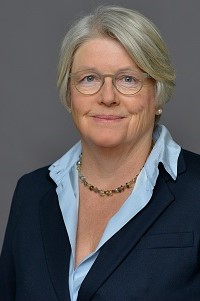Claudia Wiesemann is head of the Department for Medical Ethics and History of Medicine at University of Goettingen, was eight years a member of the German Ethics Council and engages herself for the self-determination of patients.

Professor Claudia Wiesemann
Markus Scholz für die Leopoldina
Claudia Wiesemann studied Medicine, Philosophy, History and Medical History. She was working as a medical doctor for three years, among others, in cardiology, and habilitated in History and Ethics of Medicine. She was appointed Full Professor and head of the Department for Medical Ethics and History of Medicine at the University of Goettingen in 1998. Her research interests include the ethics of reproductive medicine and family and autonomy and trust in medicine. It is of importance for her to increase the influence of patient’s perspective. Wiesemann was, among others, member and vice chair of the German Ethics Council and from 2002 – 2011 member of the Central Ethics Committee for Stem Cell Research at the Robert Koch Institute. She engages as member of the Academy of Science Leopoldina in the working group “Embryo protection in Germany” and in many current social debates with her interdisciplinary background, for example for organ donation.
Further information: https://egmed.uni-goettingen.de/de/prof-dr-claudia-wiesemann//
Embryo protection: farewell to a binary logic
Quite understandably, the potential for abuse by third parties was a major concern in the early stages of in-vitro fertilization. The German Embryo Protection Act responded to these concerns fueled by dystopian science fiction scenarios. German law is characterized by a dichotomy of the protection of life on one hand and the ‘misappropriation’ of the embryo on the other. This dichotomy obscures the fact that there is a third type of options that serve neither purpose, but aim to improve IVF technology as well as the health of the woman and the embryo. In this ethically challenging situation, it is essential to understand the relevant research contexts and to include the perspectives of those persons directly involved.
(Translation from German)